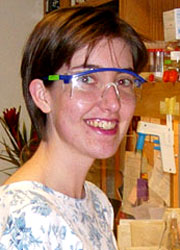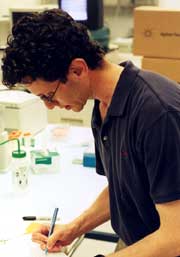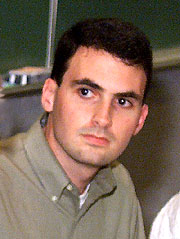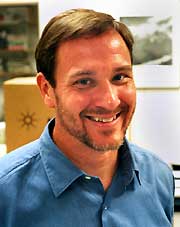|
(Page 2 of 2)
“What are the Challenges in Science Education—Now
and in the Future?”
|
 Cynthia
Edwards Cynthia
Edwards
High school teacher and chair of the Science
Department, Youth Opportunities Unlimited
The kids aren’t coming in with basic skills.
And the quality of their questions doesn’t change.
I ask my kids to write down 10 questions, and do you
know most of them can’t come up with 10. Kids aren’t
curious about science. They don’t see where it
applies or why it matters.
We don’t walk around and wonder anymore. My favorite
word is "wonderful"—to be filled with wonder. I
take my students outside when I can and walk around
and look at things. "Why is that bird doing that? Why
is this grass growing here and that growing there?"
I don’t care if my students get the answer right.
I do care that they understand the process and how to
get to that answer.
|
|
 Megan
Trevathan Megan
Trevathan
TSRI graduate student
Science educators need to be research educators, too.
Teachers need the resources and materials to teach what
is really relevant today and do it well. And researchers
need to play a role in shaping science education—helping
to educate educators and to develop curriculums.
We’re doing this on a small scale here at TSRI.
|
|
 Leonard
Thomas Leonard
Thomas
Madison High School biology and physiology teacher
There are several available curriculums. Our district
creates its own curriculum—a lot of teachers do
their own thing—but you have the fundamental question
of what courses you are going to offer. Biology/AP biology,
chemistry/AP chemistry, anatomy/physiologyÉ our district
may give up on anatomy/physiology next year.
There are four levels of student: a life sciences,
basic biology, an advanced biology, and an AP biology.
Now, we’ve decided every kid is going to be college
prep, so we don’t offer life science or basic biology
anymore. That bottom rung, those kids that need basic,
fundamental biology—whether it is because they
can’t read or it is because they don’t care
or a variety of maturational factors—those kids
are forced into an advanced biology class, which means
that the class now has to run a little slower.
|
|
 Steven
Bark Steven
Bark
Manager of the TSRI Open Access Mass Spectrometry
Facility
The most critical problem we are going to face with
science education will be getting a reasonable level
of understanding of basic research to the general population:
what it is, where it is going, and how it is impacting
people’s lives. How radically science is affecting
their lives.
Everything from the medicine you take to the glasses
that you’re wearing to the way you understand the
universe depend on the basic research that was done
ten, twenty, fifty years ago. How we perceive the future
will depend entirely on how people understand science
that is done today.
We don’t know where the future breakthroughs will
come. If people do not understand science, then they
won’t be able to critically evaluate why it is
important to continue research. They won’t support
basic research, and then the necessary tools may not
be there when we need them. Then we as scientists and
as people may start failing.
|
|
 Scott
Wolkenberg Scott
Wolkenberg
TSRI graduate student
The most important challenge is to connect new discoveries
that are being made with what people are taught. It
can take decades for these things to filter down into
the textbooks.
|
|
 Gary
Siuzdak Gary
Siuzdak
TSRI adjunct associate professor of molecular
biology
Integrating the Web into the science curriculum is
an important issue. There’s so much information
available that it’s hard to decide what to use.
Teachers and professors have to make their curriculums
more challenging. In the past, they would give lectures
and those, with the textbook, would be the only sources
of information that the students would have. Now students
can go much further with just a couple of clicks.
|
|
1 | 2 |

|
|

